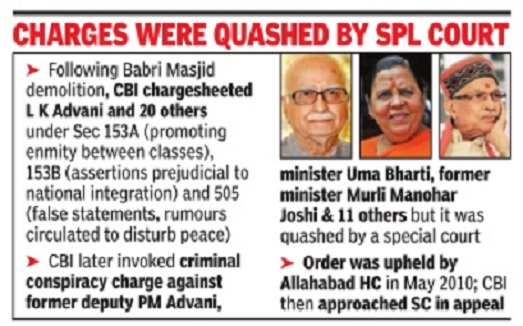Ayodhya (Babri Masjid/ Ram Janambhoomi): the dispute
This is a collection of articles archived for the excellence of their content. |
Demolition of the Babri Masjid, 1992
India Today December 29, 2008
On December 6, 1992, an unprecedented religious frenzy whipped up by an array of Hindu rightwing organisations brought down the medieval Babri Masjid, while the state, represented by 25,000 paramilitary personnel, including the elite NSG, stood like spectators. It was a monumental failure of both the intelligence and security establishments. The widespread riots that followed the demolition rent the nation’s social fabric. “The damage to India’s polity and the reputation of the law enforcers was irreparable,” wrote India Today in December 1992.
Babri Masjid demolition case
The conspiracy charge
SC faults dropping of Babri conspiracy charge against LK Mar 07 2017 : The Times of India (Delhi)
Suggests Jt Trial Of Advani, Uma, Joshi, Others
There are two sets of cases -one against L K Advani and other political and religious heads who were on the dais at Ram Katha Kunj in Ayodhya in December 1992 when the Babri Masjid fell, while the other case was against unknown karsevaks who had clambered on to and were around the disputed structure.
CBI filed a chargesheet against L K Advani, Murli Manohar Joshi, Uma Bharti and 18 others under Section 153A (promoting enmity between classes), Section 153B (imputations, assertions prejudicial to national integration) and Section 505 (false statements, rumours circulated with the intent to cause mutiny or disturb public peace). The agency had subsequently invoked charges under Section 120 B (criminal conspiracy) that were quashed by a Rae Bareli trial court against 13 persons including Advani.
The order of the trial court was upheld by the Allahabad HC and CBI thereafter approached the apex court to appeal against dropping of the conspiracy charge.
The conspiracy charge against senior BJP leaders in a Babri Masjid demolition case could be revived, with the Supreme Court noting that the charge was dropped on a technicality and suggesting joint trial of the accused.
The demolition case was back in focus in March 2017 just ahead of the final round of polling in Uttar Pradesh as a bench of Justices P C Ghose and R F Nariman said the conspiracy charge was dropped merely on a technical ground.
At that stage, the trial against BJP leaders was going on in a Rae Bareli court on charges other than conspiracy while proceedings against “unknown persons“ (kar sevaks who were around the disputed structure) are on in a Lucknow court.
Appearing for CBI [in March 2017, during the NDA regime], addi tional solicitor general Neeraj Kaul stuck to the stand taken during the tenure of the UPA government seeking revival of conspiracy charges and said the agency was agreeable to clubbing both trial proceedings.
The bench said it was prima facie of the view that conspiracy charge should not have been dropped and expressed concern over the inordinate delay in trial proceedings. It asked Kaul, appearing for the CBI, why the trials should not be clubbed together.
Senior advocate K K Venugopal, appearing for Advani, opposed the plea and contended that joint trial was not possible as about 186 witnesses would have to be re-examined.
The apex court had earlier questioned CBI for delay in filing an appeal against the high court order and had said that it would first decide the maintainability of the appeal before going into the merit of the case.
